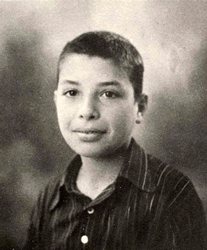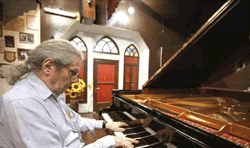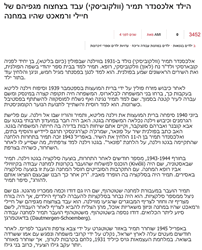The story of Alik Wolkowyski ( Alexander Tamir)
Professor Alexander Tamir was a pianist, composer, teacher and lecturer, a musical producer, known as one of the piano duo Eden-Tamir. Alexander Alexander was born in Vilna in April 2nd of 1931. He was named Alik Wolkowyski

Alik was the only son of Fania nee Kowarski and Dr. Noah (Leon) Volkowski, a physician. Alik played the piano and composed already as a young child.
World War II ; in September of 1939 the Soviet Union occupied the Vilna region. His family lived for a short time in Minsk and Tamir was sent to Moscow to attend a talent festival. At that time he was studying Russian. The family returned to Vilna/ Vilnius in 1940
In June of 1941 the Nazis occupied Vilna. Alik's family was forced to move to the ghetto. In 1942 the 11 year old Alik Wolkowyski composed the song of "Ponary" on words written by his father in Polish and translated to Yiddish by the poet Shmerke Kaczerginski . The song won a prize in a composition competition in the ghetto. The song "Ponar - Shtiler, Shtiler" became one of the symbols of the Holocaust.
Click or paste to Alik/ Alexnder talk about the song;
https://www.yadvashem.org/he/remembrance/survivors/tamir.html
(Among the songs composed in the forests and in the ghettos of Europe during the Second World War, several have become Holocaust hymns which are almost invariably sung at Holocaust remembrance events. The music for one such Yiddish song "Shtiller Shtiller" (Quieter, Quieter) was composed by an 11-year-old boy in the Vilna Ghetto in 1942 named was Alik Wolkovsky. The song is credited to him on most recordings and sheet music. The lyrics were written by his father together with the poet Shmerke Kaczerginski.)
https://www.youtube.com/watch?v=ZGuStJSIfag Some time after the competition in 1943, a selection was made in the ghetto and Alik and his father were transferred to a labor camp in Kivioli, Estonia. In another selection, his father was murdered and Alek was transferred to the Stutthof concentration camp and saved by escaping from the children's hut to the adults' hut where Alik's uncle lived . Alik worked brushing the boots of the Wehrmacht soldiers who were in the camp and fed on leftover food, which he managed to bring to the barracks after work, to help the rest of the inmates. ] He was transferred to the Dautmargen camp and liberated in April 1945 by the French army and moved to Paris. His mother also survived the Holocaust, but most of his family members were murdered, including his father. His mother immigrated to Eretz Israel and remarried.

https://www.youtube.com/watch?v=9RW_wRq6kXU
Most people have never heard of Alexander Wolkovsky. Lovers of classical music know him by his Hebrew name, Alexander Tamir.
Tamir was liberated in 1945 and that same year he emigrated to Israel, where he studied piano in Tel Aviv with Eliyahu Rodiakov and composition with Yitzhak Edel. He graduated from "Geula" High School. In 1948 he participated in the War of Independence.
Bracha and Alexander met in 1951 as students of Prof.Alfred Schroeder at the New Jerusalem Conservatory (now the Jerusalem Academy of Music and Dance). Their teacher was the one who encouraged them to play together, just as Artur Schnabel had with his student-assistant Alfred Schroeder. In1955 the Eden-Tamir duo received a scholarship to participate at the Aspen Festival and study with Vronsky and Babin. Two years later they won the first prize in the Vercelli Duo Competition in Italy.
More than 5000 performances in recitals, as soloists with orchestras, television and radio programs, festivals and concert-lectures
Eden and Tamir were the first to play outside Poland the Polish composer Witold Lutoslawski's "Variations on a Theme by Paganini". They were the first to play and record the "Rite of Spring" by Igor Stravinsky on two pianos - an adaptation by Alexander Tamir under the guidance and with the consent of the composer. They were instrumental in promoting Israeli music and many works were written for them, including those by Josef Tal, Haim Alexander, A.A.Boskovich, Marc Lavry, Mark Kopitman, Karel Salmon and Ari Ben Shabtai.
The first LP record of Israeli classical music was produced in the early 60s by "Hed Arzi" with works for two pianos played by Eden and Tamir.
Their recording of Brahms' Sonata in F minor (Decca) received the Grand Prix du Disque. They recorded for the BBC the four Brahms symphonies in the original version for two pianos by the composer.
Prof. Bracha Eden and Prof. Alexander Tamir- senior faculty members of the Jerusalem Academy of Music and Dance, taught generations of students, many of them active today in music in Israel and abroad. They contributed greatly to the development of the Academy. Bracha Eden served as the first Head of the Conservatory of the Academy and was Head of the Keyboard Department at the Academy. She also founded the International Friends Society of the Academy.
Alexander Tamir served as Dean of the Academy and as Head of the Piano Chair and the Piano Duo Chair.
In 1968 the Eden-Tamir duo founded the Music Center in Ein Karem-'Targ Center'- to enrich the music life in Jerusalem and to provide a platform for talents needing exposure. The center runs " Excellence Series of Young Artists - the future generation - broadcast on "the Voice of Music", concerts of new immigrants, concerts for the elderly and veteran Jerusalemites, producing CD's 'Jerusalem Artists' in collaboration with the Culture Department of the Jerusalem Municipality and the Ministry of Absorption. The Ein Karem music Center is also the home of The Israel Chopin Society which maintains cultural relations and exchange of artists as part of the International Federation of Chopin Societies.
The Eden-Tamir Music Center hosts as well "The Voice of Music Young Artist Competition" - in cooperation with the Jerusalem Symphony Orchestra and The Israel Broadcasting Authority.
To date, the Center hosts young artists – the future generation, new immigrants, and international and local artists in weekly concerts of which some of them are broadcast live on the "Voice of Music". Concurrently, Alexander Tamir has been and still is the editor of programs on the "Voice of Music", the Israel Broadcasting Authority.
The Eden-Tamir duo was awarded the title "Yakir Yerushalaim" for their contribution to the music life in Israel and the development of music life in Jerusalem. They won the Immigration Minister's prize, and were awarded the title of 'Honorary Fellows' of the Jerusalem Academy of Music and Dance, a degree which is awarded to those who significantly contribute to music life in Israel and abroad.
The Eden-Tamir duo lasted for over 59 years until Bracha Eden's death in 2006.
In 1998, he was contacted by film maker Raheli Schwartz, who had heard from a well-connected friend that Tamir was the composer of "Ponar," the Hebrew title of "Shtiller Shtiller." She was contemplating making a documentary about Jewish Lithuania, and she wanted him to confirm that he was indeed the boy who had composed it. But before she approached him, she had spent more than a year trying to find the connection between Alik Wolkovsky and Alexander Tamir. It was only when she was almost certain about it that she dared to approach him, and he was very evasive. Eventually she broke down the barrier, and even persuaded him to come with her to Lithuania.
He did so only to honor the memory of his father, but the trip and its aftermath weighed heavily on him, and he said more than once afterwards that her was sorry to have gone. He saw no benefit in reliving the traumatic experience: He just wanted to make music.
The change of identity included the deliberate erasing of memory. Tamir, who died last Thursday, August 15, did not want to remember those horrific days in the Vilna Ghetto. What he wanted to do was to play classical music on the piano and to teach young people how to appreciate music.
Over the years, several journalists tried to interview him about his youth, but his stock answer was that he didn't remember.
While studying at Jerusalem's Rubin Music Academy in 1951, Tamir met Bracha Eden, a native of the city who was also studying music there.
Their teacher, Prof. Alfred Schroeder, who had been a pupil of the internationally renowned Artur Schnabel, encouraged them to play duets together, and so a piano team was born. The two continued to play together in concerts in Israel and around the world for more than half a century until Eden's death in May 2006. They also made several recordings, and were frequently heard on Israel Radio's The Voice of Music. Both Tamir and Eden were also music teachers and became professors at the music academy where they first met.
In their travels abroad, they played with some of the world's greatest orchestras.
Among the songs composed in the forests and in the ghettos of Europe during the Second World War, several have become Holocaust hymns which are almost invariably sung at Holocaust remembrance events. The music for one such Yiddish song "Shtiller Shtiller" (Quieter, Quieter) was composed by an 11-year-old boy in the Vilna Ghetto in 1942 named was Alik Wolkovsky. The song is credited to him on most recordings and sheet music. The lyrics were written by his father together with the poet Shmerke Kaczerginski.
Most people have never heard of Alexander Wolkovsky. Lovers of classical music know him by his Hebrew name, Alexander Tamir.
The change of identity included the deliberate erasing of memory. Tamir, who died on August 15 2019, did not want to remember those horrific days in the Vilna Ghetto. What he wanted to do was to play classical music on the piano and to teach young people how to appreciate music.
Over the years, several journalists tried to interview him about his youth, but his stock answer was that he didn't remember.
While studying at Jerusalem's Rubin Music Academy in 1951, Tamir met Bracha Eden, a native of the city who was also studying music there.
Their teacher, Prof. Alfred Schroeder, who had been a pupil of the internationally renowned Artur Schnabel, encouraged them to play duets together, and so a piano team was born. The two continued to play together in concerts in Israel and around the world for more than half a century until Eden's death in May 2006. They also made several recordings, and were frequently heard on Israel Radio's The Voice of Music. Both Tamir and Eden were also music teachers and became professors at the music academy where they first met.
In their travels abroad, they played with some of the world's greatest orchestras.
\Noah Wolkowyski was born in Lodz, Poland in 1905 to Bernard and Khaia. He was a physician and married to Fania nee Kovarski. Prior to WWII he lived in Wilno, Poland. During the war he was in Wilno, Poland.
Noah was murdered in the Shoah.
This information is based on report by his widowwho survived and immigrated to Israel and married Mr. Shimlover of Sirkin street Tel Aviv.
Last Name
First Name
Birth Year
Place of Residence
Source
Wolkowyski
Noah
1905
Wilno, Poland
Page of Testimony Submitted byFania Shilmover
Dr. Noah Wolkowyski was born in Lodz, Poland in 1907. He was an ear nose and throat specialist and married to Fania nee Kovarski. Prior to WWII he lived in Wilna, Poland. During the war he was in Wilna, Poland.
Dr. Wolkowyski was murdered in the Shoah.
This information is based on the records/documents displayed below:
Last Name
First Name
Birth Year
Place of Residence
Source
Wolkowyski
Noah
1907
Wilna, Poland
Page of Testimony Submitted by A Feigenberg Libo
--
Leon Volkovysski. He was a physician and married. Prior to WWII he lived in Wilno, Poland. During the war he was in Wilno, Poland.
Leon was murdered in the Shoah.
This information is based on the records/documents displayed below:
Last Name
First Name
Birth Year
Place of Residence
Source
Volkovysski
Leon
Wilno, Poland
Page of Testimony Submitted by Leonid Leonovich Pora to
Josef Kowarski was born in Widze, Poland in 1899 to Yaakov and Sara. He was a merchant and married to Niuta
Josef and Niuta perished in the holocaust. The report is by Yosef's sister Fania ( mother of Alexander Tamir)

